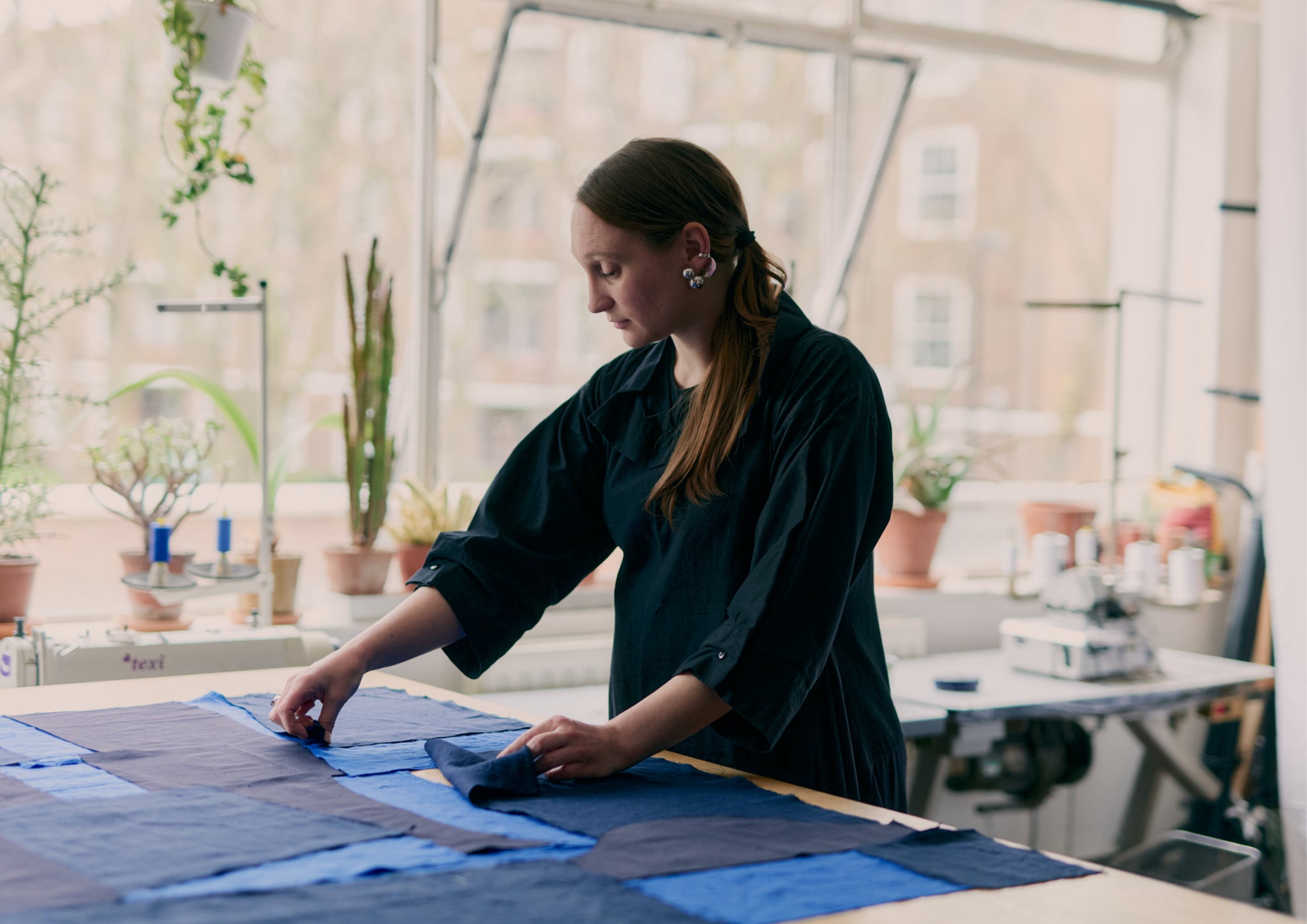
“I’ve always learned by doing,” says Phoebe English, the award-winning British fashion designer of her circular approach. “Sustainability wasn’t embedded in my education - it just wasn’t a part of design learning at that stage.” Phoebe’s eponymous label, established in 2011, is founded on the principles of textile craftsmanship and reduced environmental impact. A respect for construction and an innovative exploration of materials have been consistent in her work since her studies at Central Saint Martins, where she completed an MA under the renowned Louise Wilson. The social and planetary responsibility for which she is celebrated, however, has been an evolving journey.
“We explore and learn through each collection we make,” she says as we visit her south London studio. “Over the past few years, most people have had a climate realisation. Mine came from the perspective of a designer working in the fashion and textile sector, which, of course, has many damaging practices. Throughout history, design has responded to the questions of its time. The times we’re living through now are extreme, so we’re constantly reassessing the point of what we’re doing, trying to work out how to be a part of that system in a less damaging way.”

Phoebe is dedicated to exploring less extractive methods of fashion design, surveying the potential circularity of pre- and post-consumer textile waste. Her creative approach reimagines a new future for previously loved garments and excess, damaged, off-cuts or overproduced fabrics. Textiles are diverted from landfill and incineration, and instead, beautiful, well-crafted pieces are presented in limited quantities, future heirlooms ready for the next stage in their journey.
It is Phoebe’s thoughtful and industry-leading work that led to a collaboration with TOAST. Creating a seven-piece capsule collection using fabric off-cuts and returned and damaged TOAST items, the partnership demonstrates the synergy between our ethos of fostering longevity and circularity, and Phoebe’s design approach, which rejects fast fashion production and keeps the planet’s finite resources in mind.
“Phoebe’s approach is one of utter integrity,” says Head of Design at TOAST, Laura Shippey. “She is uncompromising in her research and is not deterred by the intense care, skill and time commitment of unpicking garments, considering the optimum layout of panels and seams for the most efficient use of the fabric and the most harmonious balance of design and functionality.”
The collection, made up of two shirts, a top, a dress, a pair of shorts, and a matching jacket and trousers, speaks to Phoebe’s signature aesthetic, which balances decorative and utilitarian perspectives, with boxy silhouettes, voluminous proportions and unique details like folded collars and pleated patchwork. “We received a variety of TOAST pieces - faulty items, items that had been returned but couldn’t be repaired - and we began by grouping materials and colours that we were drawn to, dissembling garments that fit within our palette but that spoke to the TOAST aesthetic, too.”
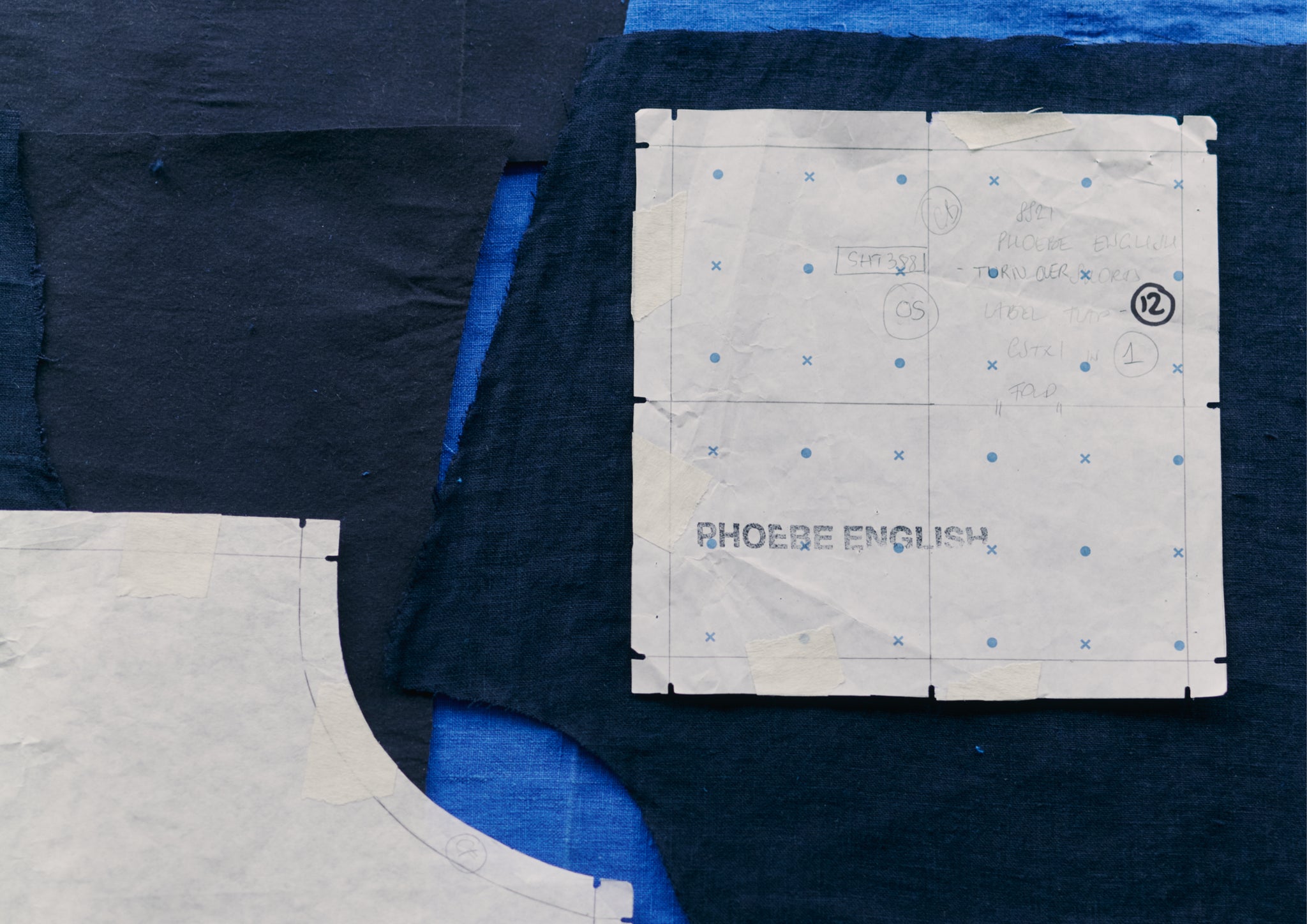
Phoebe’s designs are as low-waste as possible, and her approach to this collaboration was no exception. “With repurposing projects, you have to consider the subsequent waste that you’ll create by taking a garment apart, so we were quite cautious,” she explains. “We tried to prioritise the pieces that had the least opportunities to be reused - those with marks or large tears in the centre of the garments.” In the collection, the Repurposed Panel Shirt incorporates waste from the making of the Repurposed Dress, which in turn was crafted using reclaimed cotton from TOAST shirts from past collections. “We didn’t hack off a sleeve here, a collar there; we created new patterns that kept waste considered and to a minimum, so off-cuts can be used elsewhere.”
A celebration of the process, as well as the material, is also a highlight of the collection. “Through different approaches, the pieces show the structure of the garment, so the surface has a decorative, as well as functional, value to it.” The Repurposed Jacket and Trousers are a prime example of this approach. “Some of the TOAST pieces we received had been garment dyed, which means that the garment was dyed in one piece after it had been sewn together, rather than dyed piece by piece and then constructed,” Phoebe explains. “This is a fairly unusual way of dyeing, but it means that you’re using less water because you’re not dyeing reams of material and then cutting it up to only use some of it.” Where the tight seams are sewn, the colour of the dye doesn’t seep into the material as much, and when Phoebe took apart the pieces, they discovered unique stitch lines.
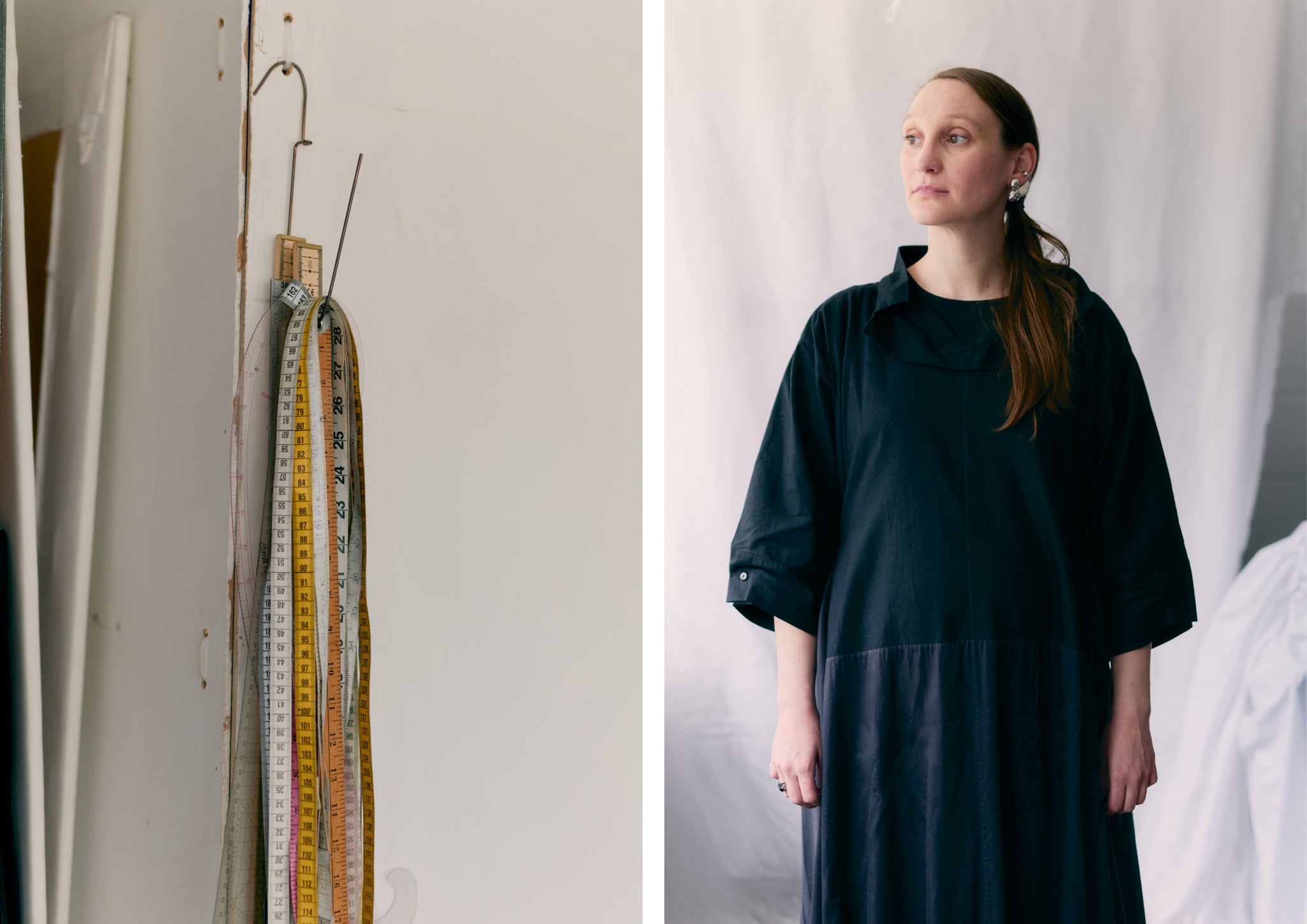
“We decided to honour the marks instead of hide them, using them as the focal point of the new design. When we reassembled the panels to create the jacket and trousers, we were creative with the placement, so the marks almost took on the look of a beautiful asymmetrical print.”
For Laura, one highlight of the collection is the Repurposed Top. “It is beautifully constructed from panels of stripe shirts recovered from damaged TOAST stock. The way Phoebe has grouped and arranged the fabric designs is lively and harmonious, but then the whole shirt is cut as a square including an ingenious collar that allows for zero waste in the pattern cutting. It has a great silhouette when you wear it, quite architectural.”
Though visually striking, as with all of Phoebe’s pieces, the collection was designed with comfort and ease in mind. “We’ve been challenged in the age of social media because a lot of what we do is about how the clothes feel on the body, which is hard to convey in an image-obsessed industry,” she says. “The silhouettes and the shapes we’ve developed over time are ones that we know feel nice to wear and resonate with our community and their daily lives. There is an intentional ease to our silhouettes.”
Though challenged by some aspects of the digital age, Phoebe’s studio is small and dexterous, meaning it’s been easier for the team to pivot to industry changes than for most. “It’s hard to consider how we’ve evolved over the past 12 years because so much has changed,” she says. “We’re a small studio, and we always look at new ways to be agile. If we want to change how we are using or sourcing a material, and we can afford to, we do it.”
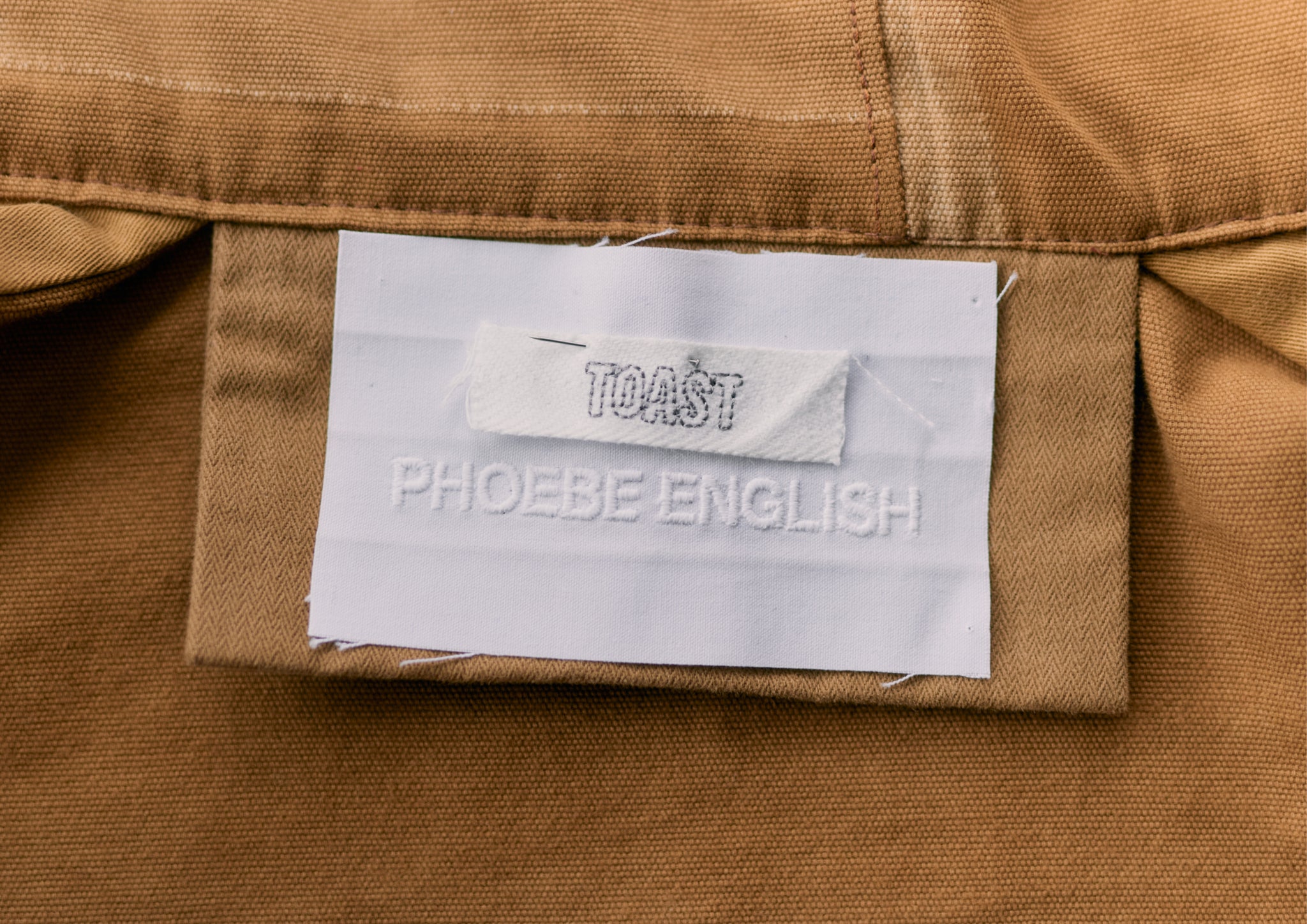
This hopeful viewpoint runs through every aspect of Phoebe’s brand. “It’s a hard time to be a creative, but humans are very imaginative. What’s not working can be reimagined. All of the systems we currently live in were imagined at one point in time, and I really believe we have the skills to continue to reimagine and restructure for the better.” This looks like slowing down - “we’ve gone from doing four collections a year, and both womenswear and menswear, to just one” - and collaborating with like-minded partners who envision as optimistic a future as Phoebe. Casting friends, like author and sustainability advocate Aja Barber, in recent London Fashion Week presentations is ”a joyous process. It’s exciting to work with people who are inspired by how we’re approaching things, and who we are inspired by in turn.”
For Phoebe, there was a natural alignment with TOAST. “I was impressed by its genuine intentions in searching for alternative ways of doing things and actively finding solutions for clothing - something we urgently need across the industry,” she says. “I was interested in how TOAST had, with Renewed and Repair, taken ownership and integrated its circular initiatives into the broader business. It’s invaluable for designers to understand that you’re creating pieces that exist beyond the point of design.”
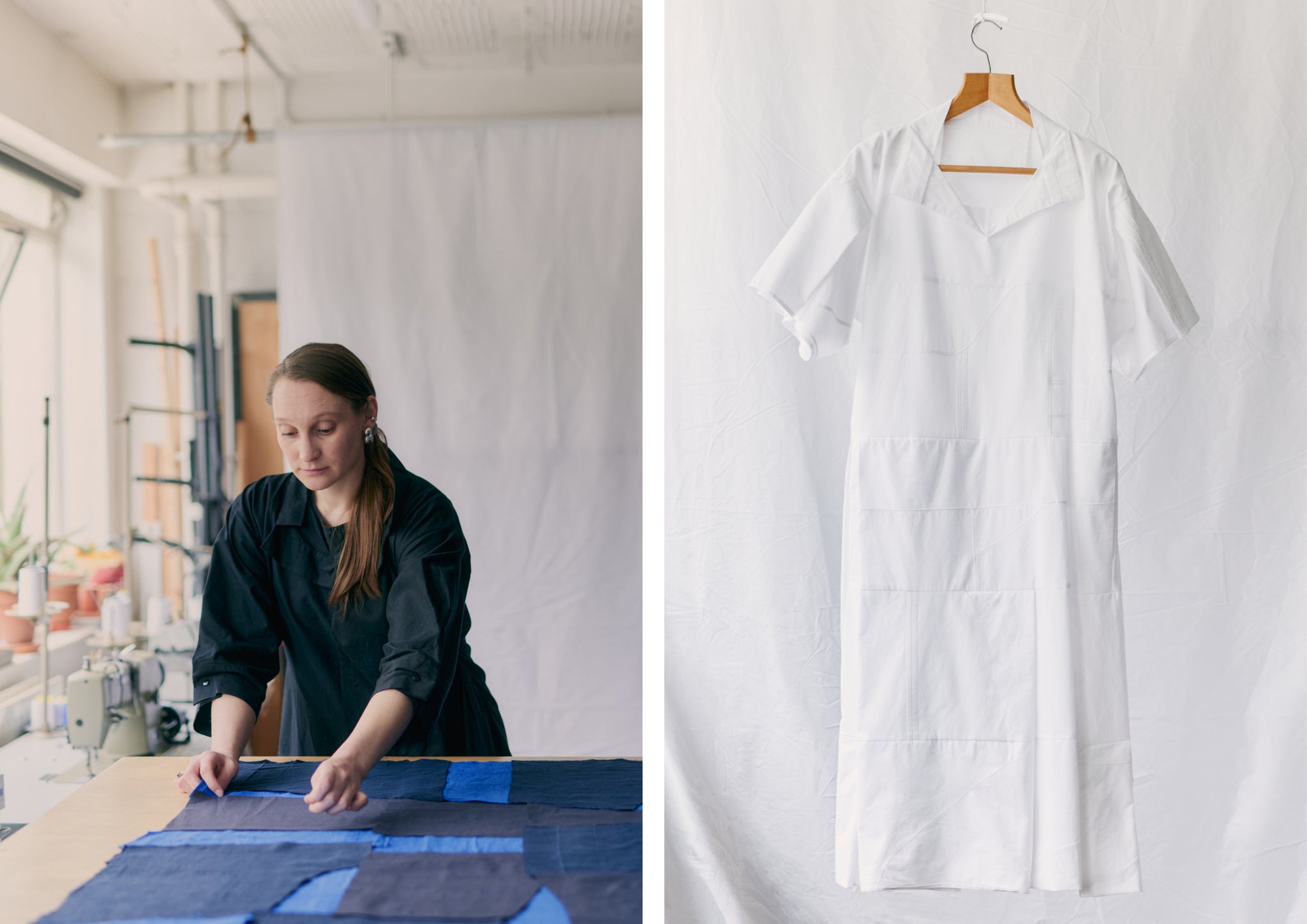
Of the collaboration, Phoebe hopes that “it will spark ideas about reusing garments and looking at them as a potential creative resource. I’m still learning and exploring,” she says. “Every collection is an experiment, a chance to move closer to where we’d like to be. It’s a continuous evolution.”
The TOAST & Phoebe English collection was displayed at our Circle Pop-Up at the Barbican in May. The pieces from the collection were available to purchase in a silent auction with all proceeds going to our charity partner Traid, which works to reduce the social and environmental impact of our garments. We are delighted to have raised £2,302 for Traid, contributing to its long-term programme with READ, supporting a further 25 educational scholarships for young women in Tamil Nadu, South India.
Read more about the impactful work of our charity partners here.
Words by Georgia Murray.
Photography by James Bannister.
Add a comment
7 comments